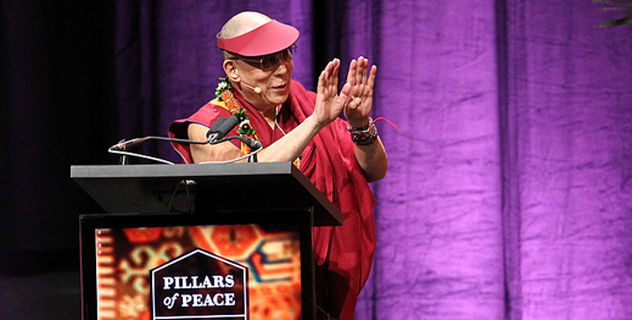
His Holiness the Dalai Lama in Ottawa
Dalai Lama mocks China’s interest in naming his successor
by Campbell Clark, Globe and Mail, Published Friday, Apr. 27, 2012.
In the political dispute over the future of Tibet, the reincarnation of a spiritual leader – the Dalai Lama – looms as the focal point of a tug-of-war with Beijing.
Concerned with restraining a nationalist movement by controlling its living symbol, the Communist Party has proclaimed its right to approve the naming of the next incarnation, traditionally identified as a young child after his predecessor’s death.
At 76 years old, the 14th Dalai Lama, Tenzin Gyatso, counters Beijing’s claims that they have the right to identify his successor with laughter and mocking jest.“It is quite strange – as non-believers, totally non-believers, atheists – showing interest about reincarnation,” the Dalai Lama said in an interview in Ottawa.
“I jokingly tell them: In order to be involved in my reincarnation, firstly, they should accept Buddhism. Or religion. Or Buddhism. Then they should recognize Chairman Mao Zedong’s reincarnation. Deng Xiaopeng’s reincarnation. Then, they have reason to show some interest about the Dalai Lama’s reincarnation. Otherwise, nonsense!”
This, after all, has to do with the reincarnation of a spiritual leader that Beijing has called a “wolf in monk’s clothing” and criticized as a deceitful separatist. The Dalai Lama has called for Tibetan autonomy within China.
His meetings with foreign leaders, like the brief encounter he held with Prime Minister Stephen Harper Friday, always hold the risk of offending the sensitivities of a rising China.
Despite the laughter with which the Buddhist leader punctuates sentences, the Dalai Lama’s succession is no trivial matter to Tibetans or to China’s leadership. Already, he has formally retired as political leader of Tibetans in exile, passing that mantle to elected secular leaders last year. But the leader of Tibet’s largest Buddhist sect remains a potent symbol inside Tibet, and a powerful magnet for support around the world.
He has left the manner of his own spiritual succession mysterious, suggesting at times that he might be the last Dalai Lama, or that he might identify a successor while he still lives, raising consternation among some followers.
In Ottawa to attend the World Parliamentary Conference on Tibet and deliver a public speech, he offered no clarity on how it will happen: “It is an open question,” he told The Globe and Mail.
The Tibetan cause he has led is in a period of transition, however. Last year, he handed over political leadership, ending forever, he said Friday, the centuries-old tradition of temporal Tibetan leadership by the Dalai Lama.
And the rise of China, and its influence in the world, is having an impact. Other countries sometimes fear to offer support for Tibet, he said, out of concern for economic relations with China.
In 2007, Mr. Harper’s first meeting with the Dalai Lama – complete with a Tibetan flag on view in the Prime Minister’s Office – raised the ire of China and caused a chill in Ottawa-Beijing relations.
This time, Mr. Harper’s brief meeting with the Dalai Lama, described as a private courtesy call with a “spiritual leader,” was described as slight backtracking by Richard Gere, the actor and pro-Tibet campaigner who opened the Ottawa conference.
The Dalai Lama, however, congratulated Mr. Harper.
“Of course, my main purpose is not to meet with government leaders,” he said. “But I’m very happy that the Prime Minister – despite some inconvenience – he stands firmly on principle.”
It remains a question whether such stands from the outside world will ever lead to Tibetan autonomy, however. In exile since 1959, the Dalai Lama warned Friday that Tibet’s environment is being ravaged and its ancient culture is at risk of being destroyed.
Inside Tibet, things are getting worse, he said, but the hope is that the spirit of Tibetans remains strong.
What is also important, he said, is the private sympathy many Chinese intellectuals now feel – and the signs of some concern for Tibet among government leaders who are more open-minded. Hard-liners who believe in tight control will not succeed forever, he argued.
“I think they believe every problem can be solved by force, by guns. That’s old thinking. During civil war, or revolutionary movements, maybe. In peacetime, I think that kind of thinking is out of date.” http://tibet.net/2012/04/30/dalai-lama-mocks-chinas-interest-in-naming-his-successor/